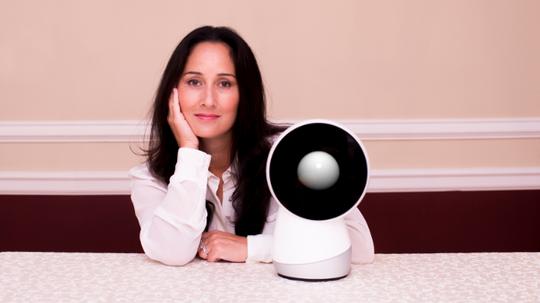
There’s no debating it. Robots have been one of the most enduring aspects of the every popular Star Wars franchise. When Disney revealed a live, working version of the new BB-8 droid from 2015’s "Star Wars: The Force Awakens" at San Diego Comic Con, people essentially went bonkers. What has made droids like BB-8, R2D2 and C-3PO so popular wasn’t just the fact that they were robots that could do cools things, but that they seemed to have real emotions and would react to their human and alien counterparts in a variety of ways. From Star Wars, we learned that even a series of beeps and boops could evoke an emotional response.
While emotional robots have been a thing of science fiction for decades, we are now finally getting to a point where these kinds of social robots will enter our households. One of the companies planning to make that a reality is Jibo, a Boston-based startup that was founded by social robotics pioneer Cynthia Breazeal. The company made its first public announcement in 2014 with an Indiegogo crowdfunding campaign that raised $3.6 million from backers, and it has since raised tens of millions of dollars from venture capital firms, including Boston’s Flybridge Capital.
A lot has changed in the nearly three years since Jibo first revealed what it calls “the world’s first family robot.” Competitors, including large companies like ASUS and LG, have revealed their own social robots for the home (with suspiciously similar form factor). Amazon has sold more than 8 million units of its Echo personal voice assistant while Google and Microsoft work on their own versions. In the meantime, Jibo’s release date for Indiegogo backers has been pushed back enough times from its original fall 2015 target to the point where the company is now saying that it will come out sometime in 2017.
"He’s not user-friendly, he’s actually friendly."
Does Jibo still have the chance to be as groundbreaking as the company originally promised? We won’t know until after Jibo finally releases its family robot, but when I talked to Breazeal on a recent afternoon, she was confident that her company still has the chance to make its mark on the world.
“We’re very fortunate to be a company that’s doing something really unique and exciting,” Breazeal, who serves as the company’s chief scientist, said. And that uniqueness is helping the company attract inbound talent in the increasingly competitive fields of robotics and artificial intelligence, she added.
This isn’t the first time Breazeal has fielded a question about whether she thinks the Amazon Echo poses any threat to Jibo. She has an Echo and similar devices at home — “I have one of everything,” she said — so she’s acutely aware of the growing voice assistant ecosystem Jibo is up against.
While Jibo and the Echo both have AI-powered voice systems that can respond to a number queries, there are some big differences that put Jibo at a level above Echo and similar devices. One of the most noticeable differences is that Jibo has cameras and a screen — though Amazon recently announced a new product called Echo Look last week that sports similar features. However, what really separates Jibo from Echo — and all other personal computing devices up until this point, Breazeal said — are Jibo’s presence and personality.
While she was doing research on social robotics at MIT, Breazeal said, she found that humans are more likely to complete goals if they engaged with a social robot that helped them keep track of their progress instead of a computer or tablet. That’s because the robot carried a greater sense of trust and credibility, Breazeal said, giving participants more self-worth and a feeling that the robot shared its goals.
Breazeal remembers at the end of one study participants made sure to say goodbye to the robot before they left because they developed such an emotional connection to it. With Jibo, that’s the kind of bond she hopes to provide.
“He’s not user-friendly, he’s actually friendly,” Breazeal said, “and people resonate with that because we’re human beings.”
With its round body, Jibo can swivel around and dance. It can make eye contact with you. It can remember personal details about you. It can, as the company calls it, "make chitchat." It can make jokes, and — perhaps most importantly, according to Breazeal — it can break the digital barriers between family members. All of this is made possible by a number of AI technologies, including machine learning, natural language processing and computer vision.
Family is a word Breazeal invokes a lot when talking about Jibo, and it’s a theme that featured prominently in Jibo’s Indiegogo launch video from 2014. Breazeal said the problem with devices that currently populate the household — voice assistants, smartphones, televisions, tablets and computers — is that they create barriers between family members. Even something as new and groundbreaking as virtual reality has the same effect.
“It’s another digital cocoon,” Breazeal said. “In the family, you want to break the cocoon down.”
To make Jibo a family robot, the company has given the device the ability to engage with multiple people at once, as well as take group photos and facilitate video chats. “It creates an interpersonal group dynamic,” Breazeal said.
Another thing Jibo is banking on is the level of support it gets from developers who build new experiences for the robot — something that has allowed Echo and other devices powered by Amazon Alexa to thrive. One of the more basic examples Jibo has showcased is a pizza ordering app that remembers personal details that could impact the order, like whether you should order for two because Jibo remembers that someone is coming over. A demo of the app also shows Jibo reminding the person ordering that her friend is allergic to olives so the ingredient should be removed. The company is also building smart home integrations so that Jibo can do things, like turn lights on and off or change their colors.
“It’s a new medium for engagement that gives an interpersonal dimension,” she said.
But first, Jibo must actually release its signature product. The years of delays have frustrated some Indiegogo backers, sometimes to the point where backers have requested and received refunds for the hundreds of dollars they put down. The company also disappointed international supporters last year when they were told Jibo wouldn’t ship outside North America because of server latency issues, which were making it difficult for the robot to understand accented English.
Breazeal does not shy away from the fact that building Jibo has had its major challenges — something that the company has documented in its updates to backers on Indiegogo. She said there is a number of moving parts the company not only needs to get right, it also needs to ensure that they all work together.
“The one hard problem is making it all work in this beautiful and seamless way,” Breazeal said, “but that means there are many problems you have to address to make that happen.”








